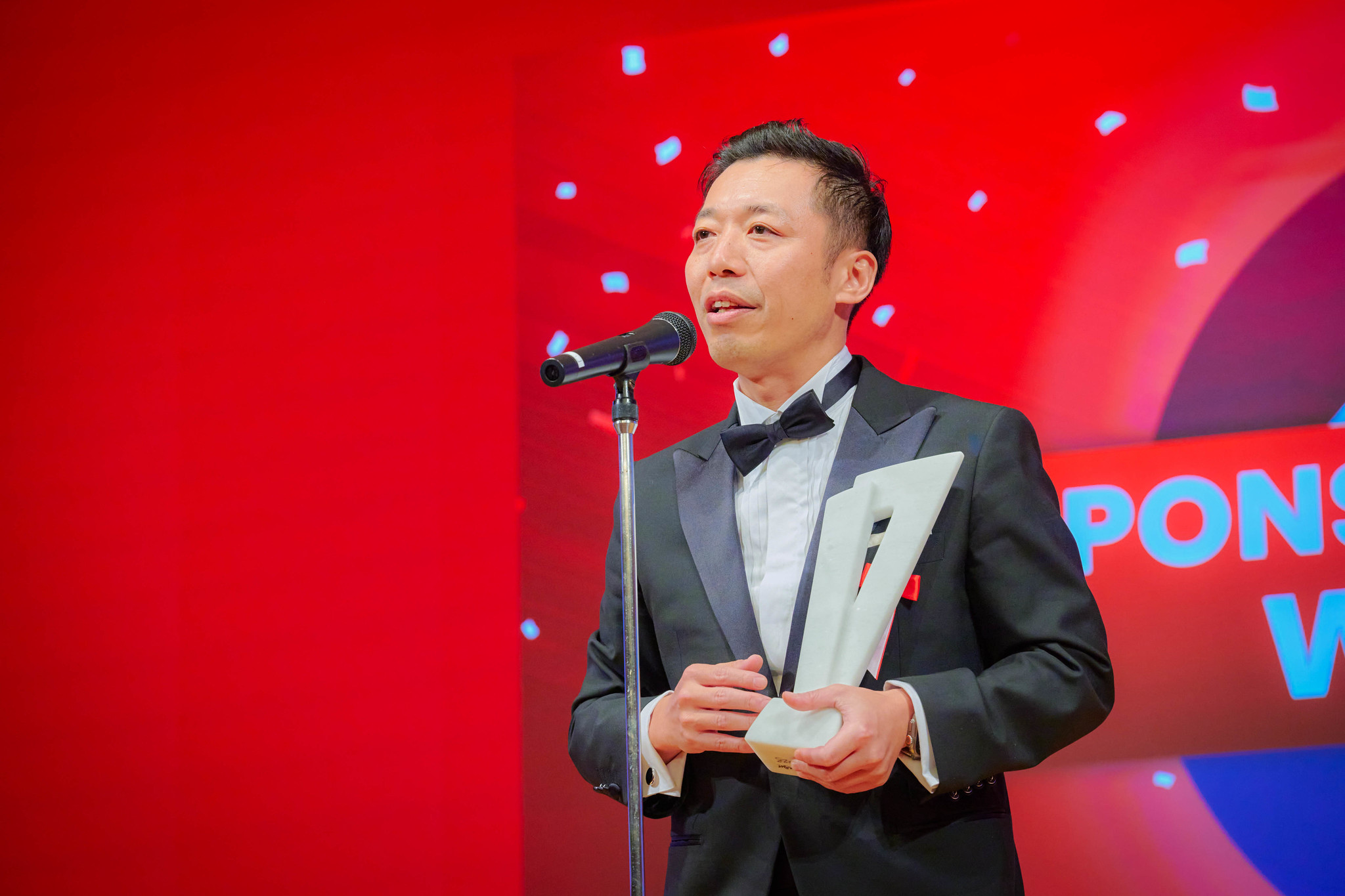Member? Please login
BBA 2023 Winner Profile: Responsible Business – AstraZeneca

Written by Sterling Content
November 15, 2023
British Business Awards
AstraZeneca K.K. (AZKK) has made history by being awarded a British Business Award (BBA) for the sixth consecutive year at the British Chamber of Commerce in Japan’s November 2 gala celebrating the best of UK–Japan business relations.
A panel of esteemed judges from the UK–Japan ecosystem selected the pharmaceutical firm as winner of the hotly contested responsible business category, which had 12 nominees. AZKK was recognised for its efforts to reduce carbon emissions by the adoption of clean energy and electric vehicles (EVs), as well as the reduction of paper use and advocacy of environmental issues.
Ambition Zero Carbon
AZKK’s effort is aligned with AstraZeneca’s “Ambition Zero Carbon,” a global flagship programme to take bold action on climate change, introduced “because of the connection between healthy people and a healthy planet.” Through the initiative, the company aims to achieve net zero greenhouse gas emissions by reducing GHG emissions from their global operation, shifting to renewable energy sources and investing in nature-based removals to compensate for any residual greenhouse gas footprint.
The company is also working to build resilience by managing physical risks (related to sites and supply chains) and transitional risks (such as those concerning regulations, markets and products) from climate change in the value chain through adaption and business continuity planning.
In the past 12 months, AZKK achieved a 100% supply of renewable energy in its nationwide facilities. Solar panels were installed at their factory, which led to a carbon dioxide reduction equivalent to the annual emission of 420 average households.
The Tokyo office’s renewable energy project provided impetus for 11 tenants in the same building to switch to renewable energy through collaboration with building owners, electricity retailers and brokerage service providers.
Furthermore, almost 60% of AZKK’s commercial fleet consisted of EVs as of July 2023, putting the company on track to achieve 100% by 2025.
In the area of product leaflets, AZKK played “a pioneering role” in the pharmaceutical industry, being one of the first companies in transitioning paper package inserts to electronic
formats, and demonstrated regulatory compliance with the Japanese government’s requirements. The digitalisation not only optimised costs and operations but also saves 180 tonnes of waste and 30 million sheets of paper annually, the equivalent of about 4,500 trees.
AstraZeneca’s digitalisation initiative started in Japan and developed into a global project, attracting the attention of The Wall Street Journal, which featured its efforts. Globally, the company spends £24.5 million a year on paper product leaflets and aims to digitise prescribing information as part of its goals to cut emissions by 50% across its value chain, Pam Cheng, AstraZeneca’s operations and sustainability chief, told the newspaper. The company is aiming to make a plan by 2025 for all its medical information to be provided electronically by 2030.

Advocating for change
As an industry leader, AZKK has spent the past 12 months promoting the importance of protecting the environment for current and future generations. Staffs have shared case studies on the company’s sustainability efforts through lectures for industry peers and the public, as well as for employee meetings. Extensive press communication and publicity have also been carried out along with educational programmes designed to show industry leadership.
AZKK has provided educational opportunities ranging from publishing an informative booklet on planetary health to supporting a children’s summer programme on environmental protection in partnership with Nissan. The programme engaged approximately 1,000 employees and their families.
In advocacy to governments and other leaders for climate action, AZKK published a white paper on environmental policy proposals and, as a member of the Japan Climate Leaders’ Partnership, shared company initiatives with 47 politicians at the organisation’s conference. At the Nagasaki G7 satellite symposium, AZKK also contributed to the G7 Health Ministers’ Communique.
Looking ahead
AstraZeneca aims to reduce emissions from its global operations and fleet by 98% of its 2015 level by 2026, and to halve its entire value chain footprint by 2030, with an interim target of a 90% reduction of its 2019 level by 2024.
In keeping with these goals, AZKK has committed to transition its entire fleet to EVs by 2025 by working with partners to expand charging infrastructure to provide EV adoption while advocating for clean, affordable energy use.
AZKK also aims to build a net-zero patient-centric healthcare system and to inspire, educate and empower people to tackle the health impacts of climate change.
Expressing pride at AZKK being awarded the accolade, Takafumi Horii, company president, said AZKK would “keep on pioneering to co-create a sustainable healthcare system and society based on AstraZeneca’s belief that the future of humanity depends on the health of people, society and the planet.”
The company’s “great progress,” he added, is “a testament to the efforts of our great team,” who he thanked along with the BCCJ for the “prestigious recognition.”






